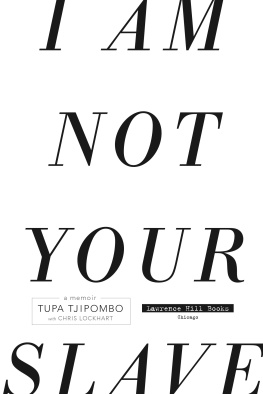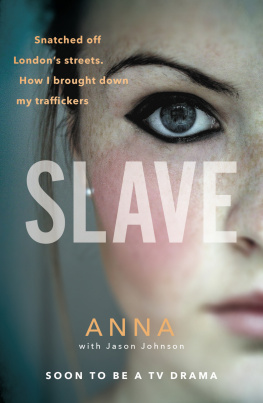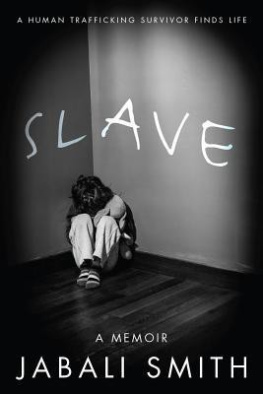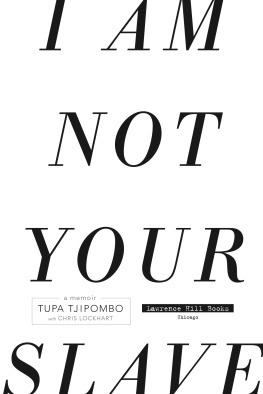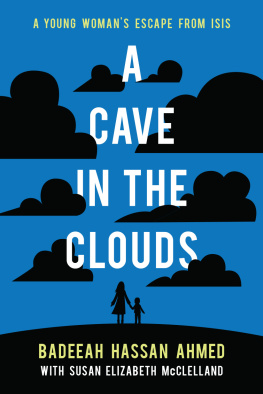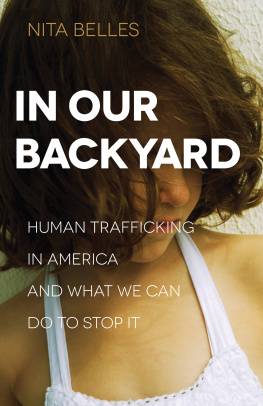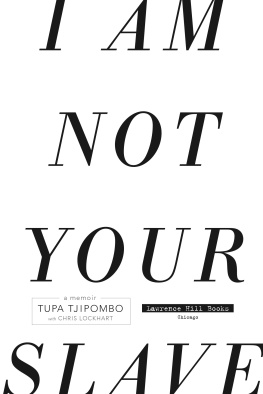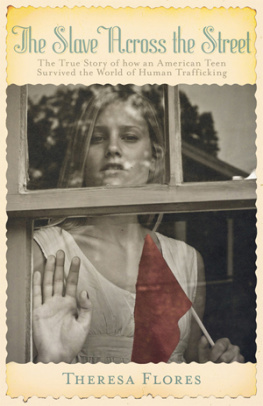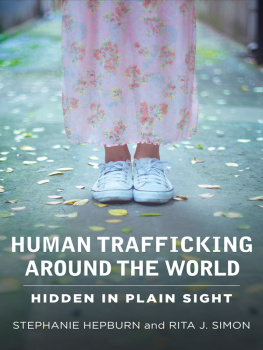Sommaire
Pagination de l'dition papier
Guide
Copyright 2020 by Tupa Tjipombo and Chris Lockhart
All rights reserved
First edition
Published by Lawrence Hill Books
An imprint of Chicago Review Press Incorporated
814 North Franklin Street
Chicago, Illinois 60610
ISBN 978-1-64160-240-2
Library of Congress Cataloging-in-Publication Data
Names: Tjipombo, Tupa, author. | Lockhart, Chris, 1967- author.
Title: I am not your slave : a memoir / Tupa Tjipombo, Chris Lockhart.
Description: First edition. | Chicago : Lawrence Hill Books, 2020. |
Summary: I Am Not Your Slave is the shocking true story of a young
African girl, Tupa, who was abducted from southwestern Africa and
funneled through an extensive yet almost completely unknown human
trafficking network spanning the entire African continentProvided by
publisher.
Identifiers: LCCN 2019029549 (print) | LCCN 2019029550 (ebook) | ISBN
9781641602372 (cloth) | ISBN 9781641602389 (pdf) | ISBN
9781641602396 (mobi) | ISBN 9781641602402 (epub)
Subjects: LCSH: Tjipombo, Tupa. | Human trafficking
victimsAfricaBiography. | Human traffickingAfrica.
Classification: LCC HQ285.T55 T55 2020 (print) | LCC HQ285.T55
(ebook) | DDC 364.15/51096 [B]dc23
LC record available at https://lccn.loc.gov/2019029549
LC ebook record available at https://lccn.loc.gov/2019029550
Interior design: Nord Compo
Printed in the United States of America
5 4 3 2 1
This digital document has been produced by Nord Compo.
PREFACE
WHEN I FIRST MET TUPA at her brothers house on a rutted back road of Opuwo in northwestern Namibia, I was struck by her story. With her obvious intelligence and insight, she told it in a steady, introspective voice and in fluent English. The story she told me was one of trauma and personal survival that left me speechless; her experience of being abducted and trafficked was the most shocking account of modern-day slavery I had ever heard. I resolved to gather her complete story, including the circumstances and deteriorating conditions that put her at risk for trafficking in the first place, the daily brutalities and routine suffering of being a slave, the people involved, the self-doubt, the ambiguities, and the essential determination to be free.
Yet there was something else about Tupas story that struck me. Despite having worked in sub-Saharan Africa for over twenty-five years and encountering many different forms and manifestations of human trafficking that were truly horrific, I still found much of her account breathtakingly shocking. Why had I not heard of so many of these things before? And how could this have happened to an individual from Namibia? The country is as remote as they come, a little-known outlier of vast desert spaces and few people with a sleepy, almost aloof quality to it.
There is so much we do not know about human trafficking, despite the proliferation of books, reports, and other publications on the topic over the past twenty years. It is particularly difficult to find personal accounts of trafficking victims. On the one hand, their voices have been silenced by an overall approach to the issue that is based on an amalgamation of statistics, generic categories, and measurable data. The result is a long stream of tedious reports, boilerplate definitions, and legislative watch lists. Any focus on the individual, which happens only rarely, has more to do with how she or he meets the criteria for a specific definition of trafficking, which, of course, transforms the person into another statistic, another object that can be counted and measured, another immutable, faceless category.
All of this brings me back to Tupa and a long, on-again, off-again conversation held over countless cups of rooibos tea at a kitchen table in a quiet town of northwestern Namibia. Her story is presented here in narrative form because it is the way she herself wanted it to be told. Writing her story was an iterative process, and we continually reviewed particular scenes or events many times over as I prompted her to recall specific details, emotions, sights, sounds, and so forth until we both felt that we had saturated that particular experience. As part of this process, I read back to her everything I wrote, and we carefully went over each section together to make sure I had included and described everything to her satisfaction.
It should be noted here that I was able to confirm much of what happened to her by personally visiting specific locations and interviewing individuals in Namibia, Angola, South Sudan, Djibouti, and the United Arab Emirates. I should also note that Tupa is a pseudonym (as are all names used in the books). From early on, we agreed that we should not use real names to protect Tupas identity and prevent her from additional harm.
There were many challenges to writing Tupas story, but she never wavered in her belief that it should be told. I remember one day, as we sat in her brothers kitchen in Opuwo, poring over the details of one particularly horrific experience of her ordeal, we decided that it was all too much and we needed to take a break for a few days. The room grew silent as I made tea and stared out the window, watching a group of children play soccer. Tupa, sitting at the kitchen table, leafed through a United Nations report on human trafficking that I had happened to bring along that day. When I turned around, she was frantically fumbling with my recorder. How do you turn this on? she said irritably. We must continue. Taken aback, I started to go through all of the reasons why we should take a short hiatus. But she abruptly cut me off. This, she said, holding up the report. It does not say anything. It is not my story. It is not anybodys story. It will not make people act. She pointed to the empty chair opposite her. Sit. I need to finish telling my story.
The result presented here is not a statistic or an exposition but an individual account of modern-day slaveryone womans story of boundless courage in the face of one of the worst human atrocities imaginable.
Chris Lockhart
April 2018
Opuwo, Namibia
I WATCHED MY PURSUERS from my concealed position among the rocks. My stomach was so nervous that I was afraid it might somehow give me away. My grandfather once told me that he could always tell when people were nervous because it created visible ripples in the air around them. I swallowed hard and tried to remain calm. The two men Id escaped from that morning leaned against their battered pickup truck, talking closely as they watched a third man. Though I had never seen him before, it was the third man who worried me the most. He was a slight, almost inconspicuous figure who moved in a soft, deliberate manner, his head bowed as he carefully scanned the ground before him. Occasionally, he squatted to get a closer look at the ocher-colored sand of the dry riverbed. He is reading the ground, I thought, and my heart dropped as I realized that the delicate frame and almost feline body language of this curious individual marked him as a Bushman. There was no point in trying to lose them now, I thought; it was just a matter of time. I remembered my father telling me stories of how the South African Defence Force had used Bushmen in this part of southeastern Angola during the war years to search for infiltration routes and water holes used by South West Africa Peoples Organization rebels. He said they always feared the Bushmen trackers the most because they led the white soldiers straight to their camps. It was why they were known as flechasarrows.
As I shifted my position, I winced from the pain in my hip. I had bruised it that morning when I dropped over the side of the truck and landed awkwardly on a rock. I guess my adrenaline had been pumping so hard that at the time I hardly noticed or cared. But now, as I lay still and watched my pursuers, I became conscious of a terrible throbbing in my right hip, as well as the razor-like torment from the many cuts and scratches on my legs and arms.

